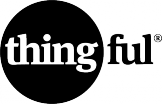Bio
- Age of business: One year
- Name of business: Thingful Limited
- Location: London, UK
- Team: Four
- Funding: €100,000
- Pitch: Thingful is a search engine for the internet of things, indexing across dozens of existing IoT networks and infrastructures, enabling the discovery of nearby connected objects like energy meters, pollution sensors, radiation monitors, seismographs and even planes, ships, bikes and weather stations and any Hypercat-enabled IoT infrastructure.
What’s your vision?
Thingful’s vision is an interoperable internet of things where sensors, devices and connected objects can find each other on-the-fly and make use of each others’ real-time data with the active consent of their owners. We want to enable individuals and institutions to control how their IoT data is used, and to empower them to make more valuable and effective decisions through secure, cross-domain data discovery and access.
How did you meet?
Usman Haque, as the founder and CEO, brought together the foundational team. Each team member had previously worked with Usman. Sam Malube, CTO, was the first system architect of Usman Haque’s previous IoT venture, Pachube. Moeen Khawaja, COO, led the first round of investment into that venture and Andrew Caleya Chetty, CMO, led the development of content and technology of UK’s first connected visitor centre ‘The Public’ where Usman was one of the commissioned technologist.
Are you working with any other partners?
We are working with large businesses that have direct interest in acquiring data from different commercial IoT sources and with those who own large networks of IoT devices and exploring potential routes to monetising the data. We are also working with a corporate as a channel partner for our services in their investment portfolio.
If you were to start again, what would you do differently?
We are still starting up, so we’re not even thinking about how we would start again. In any case our agile approach means continual re-evaluation of both our position and our direction, which means constantly both making mistakes and learning from them. It probably wouldn’t be possible to “start again” without making mistakes, even if they’re different ones. The key is to learn from them as quickly as possible.
How has ODINE helped you so far?
ODINE is a source of soft funding which is absolutely a critical need for very early stage technology businesses like Thingful. Grant funding provides financial space to experiment in innovative technologies and business models and fills a critical gap between R&D and market readiness. ODINE’s mentor support has been a great resource for us to get an outside insider’s perspective on our assumptions and a source of introductions and commercial leads.
What advice would you give to other companies pitching to ODINE?
ODINE funding is to help startups get close to market and it is necessary for applicants to think through and develop a defensible business model. Idea and technology sometimes can get over emphasised which is good but sufficient. It is also helpful if ODINE’s funding is matched with applicant’s funding to some extent as it is likely to convey a strong commitment to the proposed program of work.
What would you say to other startups thinking of working with open data?
Open data is great enabler but commercial sustainable propositions generate value. Data is the raw material which helps people to find answers to questions but people pay for answers and not data. Open data startups must think very clearly about the value addition they will provide using the open data; it could be a low value high volume play with handling it, cleaning, formatting and processing it to make it easier to use, or it could be a high value low volume play of creating general insights or providing bespoke advice to customers.
How would you encourage big business to buy into the open data movement?
Open data movement needs to make the “data spectrum” as it key communication message and the word “open” can scare away commercial businesses. In order for large businesses to join, they must be able to develop or extract value from contributing data and “data spectrum” is a great tool to differentiate types of data. It is all about creating differentiated access to data rather than making it “open” which is also central to Thingful’s vision for IoT data.
What’s the key trend in open data at the moment?
The key shift we are witnessing is cultural where people and organisations are beginning to understand the importance of data as a digital infrastructure for the economy. We are also witnessing increased willingness on part of businesses to experiment with data monetisation models.
This story was first published on The Guardian.




